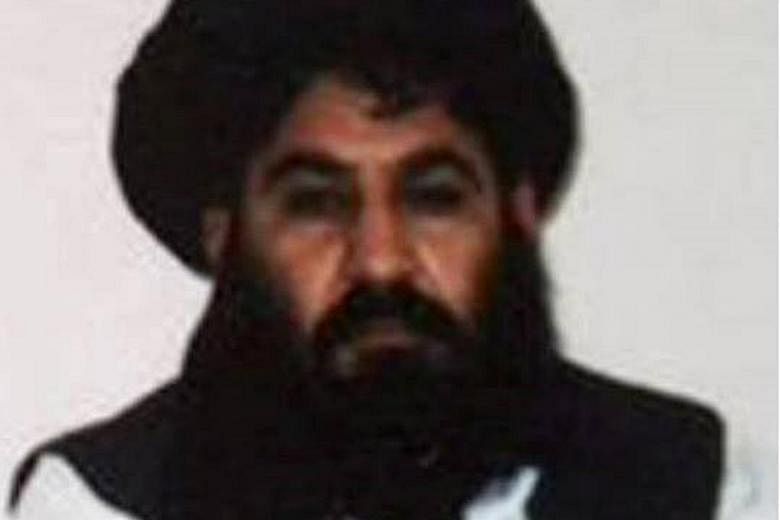KABUL (REUTERS, AFP) - Afghanistan's spy agency Sunday (May 22) Taleban leader Mullah Akhtar Mansour was killed in a US bombing raid, the first confirmation from regional officials of his death, which marks a potential blow to the resurgent militant movement and could scupper any immediate prospect of peace talks.
"Mansour was being closely monitored for a while... until he was targeted along with other fighters aboard a vehicle," Afghanistan's National Directorate of Security said in a statement.
The death of Mansour may trigger a battle for succession and deepen fractures that emerged in the insurgent movement after the death of its founder, Mullah Mohammad Omar, was confirmed last year, more than two years after he died.
Saturday's strike in a remote border area in Pakistan was authorised by President Barack Obama and included multiple drones, US officials said. It showed the United States was prepared to go after the Taleban leadership in Pakistan, which the Western-backed government in Kabul has repeatedly accused of sheltering the insurgents.
It also underscored the belief among US commanders that under Mansour's leadership, the Taleban have grown increasing close to militant groups like Al-Qaeda, posing a direct threat to US security.
"The United States conducted a precision air strike that targeted Taleban leader Mullah Mansour in a remote area of the Afghanistan-Pakistan border," US Secretary of State John Kerry told a news conference while on a visit to Myanmar.
Mansour posed a "continuing, imminent threat" to US personnel and Afghans, he said. "If people want to stand in the way of peace and continue to threaten and kill and blow people up, we have no recourse but to respond and I think we responded appropriately," Kerry said.
Kerry did not confirm whether the strike had killed Mansour. A Pentagon spokesman said earlier the results of the strike were being assessed.
The Afghan government had said Mansour's death had not been confirmed though a spokesman for President Ashraf Ghani said it seemed he was dead. Top officials said privately they believed he had been killed.
Pakistan, meanwhile, said it was "seeking clarification" about the strike on Pakistani soil. "I have seen the reports. We are seeking clarification," foreign ministry spokesman Nafees Zakaria said in a statement.
He added that Pakistan, where the Afghan Taliban's top leadership has been sheltering for years, wanted the Taleban to return to the negotiating table to end the long war in Afghanistan. "Military action is not a solution," he added.
The Taleban have made no official statement but two commanders close to Mansour denied he was dead.
With the report of Mansour's death, attention has focused on his deputy, Sirajuddin Haqqani, leader of a notorious network blamed for most big suicide attacks in Kabul.
"Based purely on matters of hierarchy, he would be the favourite to succeed Mansour," said Michael Kugelman, a senior associate at the Woodrow Wilson Institute think-tank.
Mansour was formally appointed head of the Taleban in July last year following the revelation that the group's founder Mullah Omar had been dead for two years.
The group saw a resurgence under the firebrand supremo with striking military victories, helping to cement his authority by burnishing his credentials as a commander.
They briefly captured the strategic northern city of Kunduz in September in their most spectacular victory in 14 years. Southern opium-rich Helmand province is almost entirely under insurgent control.
Pentagon spokesman Peter Cook said Mansour had been "actively involved" with planning attacks across Afghanistan, and presented an "obstacle to peace, prohibiting Taleban leaders from participating in peace talks with the Afghan government".
"Since the death of Mullah Omar and Mansour's assumption of leadership, the Taleban have conducted many attacks that have resulted in the death of tens of thousands of Afghan civilians and Afghan security forces as well as numerous US and coalition personnel," Cook added.
But Mansour's apparent death was not immediately seen as likely to push the Taleban closer to peace talks and could press them to show they are still able to wage an aggressive battle, observers say.
"The war has been going on for so long, the Taleban has so many leaders and so much ability to function at the local level even without strong central guidance, that we would be well advised to keep expectations in check," said Michael O'Hanlon of the Brookings Institution think-tank.
The drone attack comes just days after representatives from the US, China, Pakistan and Afghanistan held another round of negotiations in Islamabad aimed at reviving long-stalled direct peace talks between the Afghan government and the Taleban.
Pressure has been building in recent months for the United States to return to direct attacks on the Taleban, particularly via air strikes.
"We need to take the gloves off those forces already in-country," namely those belonging to the United States and Nato, and authorise air strikes, David Petraeus, the ex-CIA director and former commander of coalition forces in Afghanistan and Iraq, wrote in The Wall Street Journal inn the past week.
Nato ended its combat mission in Afghanistan in December 2014, pulling out the bulk of its troops, although a 13,000-strong residual force remains for training and counterterrorism operations.
The Taleban, who announced the start of their annual spring offensive last month, have already stepped up their campaign against the Western-backed Kabul government for the season. If Mansour's death is confirmed, his two newly named deputies - influential religious leader Haibatullah Akhundzada and Sirajuddin Haqqani - could likely step up to fill the power vacuum.
They are both seen as close to the Pakistani military establishment, which has historically nurtured and supported the Taleban.
"Mansour's apparent death will trigger fresh infighting and a new leadership succession battle inside the Taleban," Kabul-based analyst Mia Gul Waseeq told AFP.

